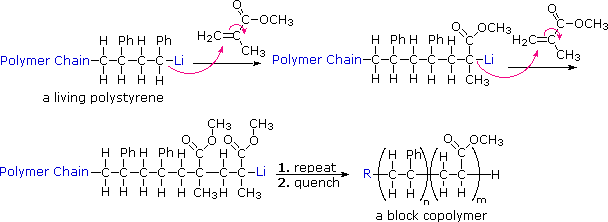Innovative Polymers: Reinventing Modern Manufacturing
Innovative Polymers: Reinventing Modern Manufacturing
Blog Article
Checking Out the Varied Applications and Advantages of Polymers in Different Industries
Polymers, with their diverse variety of residential properties and capabilities, have actually come to be important in different sectors, each enjoying special take advantage of their application. Polymers. From improving safety and performance in the automobile industry to transforming medical devices in the healthcare sector, polymers play a pivotal role. Furthermore, their environmentally friendly nature is altering the landscape of sustainability methods. As we look into the midsts of polymers in electronics, we uncover sophisticated innovations, while their structural stability changes the world of building and construction and infrastructure. The pervasive impact of polymers across markets is a testament to their versatility and flexibility, forming the future of numerous sectors.
Automotive Field Applications
Polymers play an essential duty in improving the performance and resilience of numerous components within the automotive market. These functional materials are thoroughly made use of in the manufacturing of various components, ranging from indoor parts to under-the-hood applications. One popular use polymers in the automotive industry is in the manufacturing of light-weight components. By replacing standard steel parts with polymer-based choices, vehicles can accomplish enhanced gas efficiency without jeopardizing on stamina or safety.

Healthcare Industry Advantages
In numerous healthcare applications, the advantages of using polymers are commonly acknowledged for their varied array of advantageous residential or commercial properties. Polymers play a vital role in the health care market due to their flexibility, biocompatibility, and cost-effectiveness. One of the key benefits of polymers in medical care is their capacity to be customized to certain demands, such as versatility, resilience, and biodegradability, making them suitable for a vast array of medical applications.
Polymer-based materials are thoroughly made use of in clinical tools, such as catheters, implants, prosthetics, and medication delivery systems, as a result of their biocompatibility and capacity to simulate natural cells. These products can lower the danger of allergies or denials, improving client safety and security and results. Furthermore, polymers are lightweight, making them ideal for wearable medical devices and guaranteeing person comfort.
In addition, polymers allow the advancement of cutting-edge treatment approaches, such as hydrogels for tissue design and nanocomposites for targeted medicine distribution. Their simplicity of processing and sanitation makes them necessary for preserving high requirements of hygiene in health care settings. In general, the varied advantages of polymers add significantly to improvements in clinical innovation and person care.
Environmental Advantages of Polymers

Furthermore, polymers can contribute to power cost savings due to their lightweight nature. In industries such as transportation, light-weight polymer products can aid reduce fuel consumption and greenhouse gas emissions. Furthermore, polymers can allow the development of energy-efficient products such as insulation products that enhance power conservation in buildings.
In addition, polymers play an important function in lowering water air pollution. For instance, using polymer-based purification systems can effectively eliminate toxins and impurities from wastewater, guarding water sources and ecosystems. Overall, the environmental benefits of polymers make them useful assets in promoting sustainability and eco-friendly practices throughout numerous markets.
Polymers in Electronics and Modern Technology
Taking into consideration the boosting demand for innovative and lasting options in contemporary sectors, the combination of advanced polymer modern technologies in the realm of electronics and technology has actually emerged as a crucial method for driving efficiency and efficiency. Polymers have reinvented the electronics sector by enabling the manufacturing of lighter, much more adaptable, and long lasting digital devices. From smart devices to medical tools, polymers play a critical function in boosting product layout and performance.
One substantial advantage of polymers in electronic devices is their insulating residential or commercial properties, which aid safeguard fragile digital components from environmental variables and electrical disturbance. In addition, polymers are important in the growth of flexible screens, wearable modern technology, and printed electronic devices, supplying unlimited possibilities for producing smart and interconnected gadgets.
Additionally, the usage of polymers in electronic packaging has actually brought about developments in miniaturization and thermal administration, boosting the overall efficiency and reliability of electronic systems. As technology continues to progress, the versatility and adaptability of polymers will unquestionably drive additionally innovation in the electronics industry, shaping the future of innovation.
Function of Polymers in Building and Facilities
Polymers provide various advantages in the construction sector due to their adaptability, toughness, and cost-effectiveness. One essential role of polymers in building and construction is their use in finishings and sealants, giving security versus ecological elements such as dampness, UV radiation, and deterioration.
Additionally, polymers play a vital function in lasting building practices by making it possible for the development of like it energy-efficient frameworks. Protecting products made from polymers assist regulate indoor temperature levels, decreasing the demand for heating and cooling down systems and ultimately decreasing energy intake. The use of polymer-based composites in framework projects such as bridges and roadways boosts their longevity and minimizes upkeep costs. Overall, the incorporation of polymers in construction and facilities displays their substantial effect on contemporary engineering techniques.
Verdict
In verdict, polymers play an important function in different sectors such as auto, medical care, environmental, electronics, and building and construction. Their versatile residential or commercial properties make them beneficial in creating innovative solutions and items. From improving fuel efficiency in vehicles to enhancing medical devices, polymers supply countless benefits. In addition, their influence on reducing waste and advertising sustainability highlights their relevance in modern-day applications. The extensive use polymers shows their substantial payment to progressing innovation and improving quality of life.
Report this page